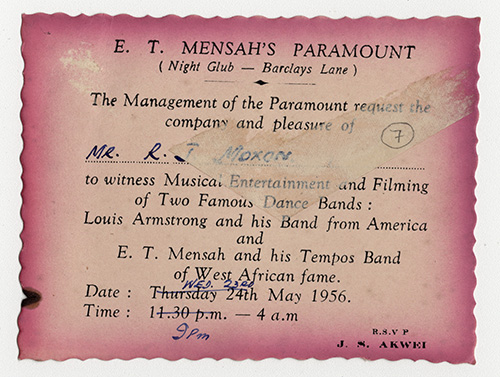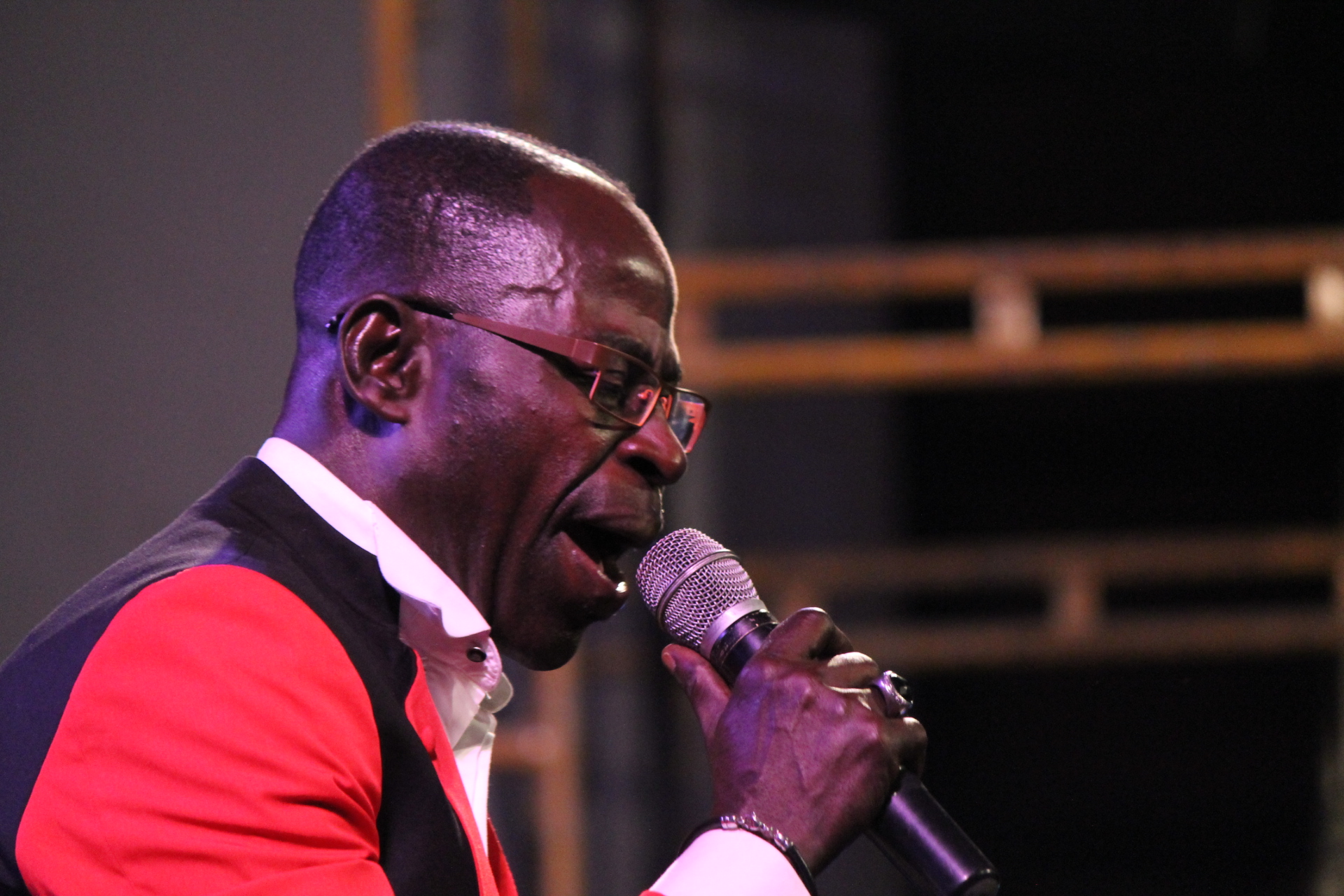|
Highlife
Highlife is a music genre that started in present-day Ghana in the 19th century, during its history as a colony of the British Empire and through its trade routes in coastal areas. It describes multiple local fusions of African metre and western jazz melodies. It uses the melodic and main rhythmic structures of traditional Akan music, Kpanlogo Music of the Ga people, but is typically played with Western instruments. Highlife is characterized by jazzy horns and multiple guitars which lead the band and its use of the two-finger plucking guitar style that is typical of African music. Recently it has acquired an uptempo, synth-driven sound. Highlife gained popularity in the genre "Native Blues" prior to World War II before production was shut down. After the war its popularity came back within the Igbo people of Nigeria, taking their own traditional guitar riffs and the influence of the Ghanaian highlife performing ideas, mixed and perfected it to form Igbo highlife which beca ... [...More Info...] [...Related Items...] OR: [Wikipedia] [Google] [Baidu] |
Igbo Highlife
Igbo highlife is a contemporary musical genre which combines highlife and Igbo traditional music. It first started off in the southeast region of Nigeria, during the 1920s in Lagos. The genre is primarily guitar-based music, with rare characteristic blend of horns and vocal rhythms. Igbo highlife lyrics are sung mostly in Igbo with occasional infusion of Pidgin English. One of the most influential composers and performers of the music is Chief Stephen Osita Osadebe whose career spanned over 40 years. Osadebe's discography comprises numerous popular songs including the 1984 hit "Osondi Owendi" which launched him on the world stage as a pioneer of the Igbo highlife genre. Singer guitarist Oliver De Coque is considered "one of the prime exemplars of and chief innovators in contemporary Igbo popular music." Coque was responsible for the increasing popularity of Igbo highlife with a style influenced by Congolese guitar flavor. Among his best known hits are "Biri Ka Mbiri", "Ana Enw ... [...More Info...] [...Related Items...] OR: [Wikipedia] [Google] [Baidu] |
Guajeo
A guajeo (Anglicized pronunciation: ''wa-hey-yo'') is a typical Cuban ostinato melody, most often consisting of arpeggiated chords in syncopated patterns. Some musicians only use the term ''guajeo'' for ostinato patterns played specifically by a tres, piano, an instrument of the violin family, or saxophones. Piano guajeos are one of the most recognizable elements of modern-day salsa. Piano guajeos are also known as '' montunos'' in North America, or '' tumbaos'' in the contemporary Cuban dance music timba. History The guajeo shares rhythmic, melodic and harmonic similarities with the short ostinato figures played on marimbas, lamellophones, and string instruments in sub-Saharan Africa. The guajeo is a seamless blend of African and European musical sensibilities, and was first played as accompaniment on the tres in the Afro-Cuban son and related music. The tres is a Cuban guitar-like instrument, consisting of three sets of double strings. Changüí The guajeo eme ... [...More Info...] [...Related Items...] OR: [Wikipedia] [Google] [Baidu] |
Ghanaian Diaspora
The Ghanaian people are a nation originating in the Ghanaian Gold Coast. Ghanaians predominantly inhabit the Republic of Ghana and are the predominant cultural group and residents of Ghana, numbering 30 million people as of 2020, making up 85% of the population. The word "Ghana" means "warrior king". An estimated diaspora population of 4 million people worldwide are of Ghanaian descent. The term ethnic Ghanaian may also be used in some contexts to refer to a group of related ethnic groups native to the Gold Coast. History The ethnogenesis of Ghanaians is traced back to nomadic migration from Nubia along the Sahara desert then south to the Gold Coast, and the Ghanaian ethnogenesis taking place on the Ghanaian Gold Coast region from the 10th to 16th century AD. Early Ghanaians were involved in a lucrative trade with gold bars and other natural minerals to the Portuguese in 1471; these Ghanaian states were among the wealthiest on the African continent from the 17th century ... [...More Info...] [...Related Items...] OR: [Wikipedia] [Google] [Baidu] |
Palm-wine Music
Palm-wine music (known as maringa in Sierra Leone) is a West African musical genre. It evolved among the Kru people of Liberia and Sierra Leone, who used Portuguese guitars brought by sailors, combining local melodies and rhythms with Trinidadian calypso to create a "light, easy, lilting style". It would initially work its way inland where it would adopt a more traditional style than what was played in coastal areas. It would eventually gain popularity after Sierra Leone musician Ebenezer Calendar recorded songs in the 1950s and 1960s and continues to hold a small amount of that popularity. Etymology Palm-wine music was named after a drink, palm wine, made from the naturally fermented sap of the oil palm, which was drunk at gatherings where early African guitarists played. History This music was created from a fusion of local and foreign sailors, dock workers, and local working-class people who would go to palm-wine bars to drink and listen to music. Portable instruments a ... [...More Info...] [...Related Items...] OR: [Wikipedia] [Google] [Baidu] |
Ghana
Ghana (; tw, Gaana, ee, Gana), officially the Republic of Ghana, is a country in West Africa. It abuts the Gulf of Guinea and the Atlantic Ocean to the south, sharing borders with Ivory Coast in Ghana–Ivory Coast border, the west, Burkina Faso in Burkina Faso–Ghana border, the north, and Togo in Ghana–Togo border, the east.Jackson, John G. (2001) ''Introduction to African Civilizations'', Citadel Press, p. 201, . Ghana covers an area of , spanning diverse biomes that range from coastal savannas to tropical rainforests. With nearly 31 million inhabitants (according to 2021 census), Ghana is the List of African countries by population, second-most populous country in West Africa, after Nigeria. The capital and List of cities in Ghana, largest city is Accra; other major cities are Kumasi, Tamale, Ghana, Tamale, and Sekondi-Takoradi. The first permanent state in present-day Ghana was the Bono state of the 11th century. Numerous kingdoms and empires emerged over the centuri ... [...More Info...] [...Related Items...] OR: [Wikipedia] [Google] [Baidu] |
Ga People
The Ga-Dangbe, Gã-Daŋbɛ, Ga-Dangme, or GaDangme are an ethnic group in Ghana, Togo and Benin. The Ga and Dangbe people are grouped respectively as part of the Ga–Dangme ethnolinguistic group. The Ga-Dangmes are one ethnic group that lives primarily in the Greater Accra of Ghana. Ethnic Ga family names (surnames) include Nikoi, Amon, Kotey, Kotie, Adei, Kutorkor, Oblitey, Lartey, Nortey, Aryee, Poku and Lamptey. The following are names derived from the ethnic Dangme and common among the Ningos Nartey, Tetteh, Kwei, Kweinor, Kwetey, Narteh, Narh, Dugbatey, Teye, Martey, Addo, Siaw, Saki, Amanor, Djangba. These are aligned to the ethnic Ga as well: Lomotey, Tetteh, Ankrah, Tetteyfio, Laryea, Ayitey, Okai, Bortey, Quaye, Quaynor, Ashong, Kotei, Sowah, Odoi, Ablor, Adjetey, Dodoo, Darku and Quartey. (Dawhenya royal family name: Darpoh) Under their great leader King Ayi Kushi (Cush) (1483-1519) they were led from the east in several states before reaching their destination in ... [...More Info...] [...Related Items...] OR: [Wikipedia] [Google] [Baidu] |
Afrobeat
Afrobeat is a Nigerian music genre that involves the combination of West African musical styles (such as traditional Yoruba music and highlife) and American funk, jazz, and soul influences, with a focus on chanted vocals, complex intersecting rhythms, and percussion.Grass, Randall F. "Fela AnikulaThe Art of an Afrobeat Rebel". ''The Drama Review: TDR''. MIT Press. 30: 131–148. The style was pioneered in the 1960s by Nigerian multi-instrumentalist and bandleader Fela Kuti, who is responsible for popularizing the style both within and outside Nigeria. Distinct from Afrobeat is Afrobeats – a sound originating in West Africa in the 21st century, one that takes in diverse influences and is an eclectic combination of genres such as hip hop, house, jùjú, ndombolo, R&B and soca. The two genres, though often conflated, are not the same. History Afrobeat was developed in Nigeria in the late 1960s by Fela Kuti who, with drummer Tony Allen, experimented with different ... [...More Info...] [...Related Items...] OR: [Wikipedia] [Google] [Baidu] |
Igbo People
The Igbo people ( , ; also spelled Ibo" and formerly also ''Iboe'', ''Ebo'', ''Eboe'', * * * ''Eboans'', ''Heebo''; natively ) are an ethnic group in Nigeria. They are primarily found in Abia, Anambra, Ebonyi, Enugu, and Imo States. A sizable Igbo population is also found in Delta and Rivers States. Large ethnic Igbo populations are found in Cameroon, Gabon, and Equatorial Guinea, as well as outside Africa. There has been much speculation about the origins of the Igbo people, which are largely unknown. Geographically, the Igbo homeland is divided into two unequal sections by the Niger River—an eastern (which is the larger of the two) and a western section. The Igbo people are one of the largest ethnic groups in Africa. The Igbo language is part of the Niger-Congo language family. Its regional dialects are somewhat mutually intelligible amidst the larger " Igboid" cluster. The Igbo homeland straddles the lower Niger River, east and south of the Edoid and Ido ... [...More Info...] [...Related Items...] OR: [Wikipedia] [Google] [Baidu] |
Amakye Dede
Dan Amakye Dede (born 5 January 1958) is a Ghanaian musician. He is one of Ghana's premier high-life artists popularly referred to as "Iron Boy", "the high-life maestro" and "Abrantie" (). Amakye Dede was born in Agogo, Asante Akim. He attended Agogo Roman School. He is best known for classic songs such as: "Jealousy go shame", "Dabi Dabi Ebeye Yie", "Akwadaa Wesoa", and "Iron Boy." On 2 January 2016, he was involved in an accident that killed his manager and seriously injured his bodyguard. Amakye Dede was installed as a sub-Chief at Agogo in the Asante Akim traditional area. Career Dede began his career in 1973 when he joined the Kumapim Royals as a composer and vocalist. This band, led by Akwasi Ampofo Agyei (AAA), had hits such as "Abebi Bewua Eso", "Wanware Me A", "Odo Mani Agyina", and the seminal "Ohohoo Batani". Dede moved to Nigeria, where he had his hit "Jealousy go shame". He then formed his own band, the Apollo High Kings, in 1980. He dominated the high-life sc ... [...More Info...] [...Related Items...] OR: [Wikipedia] [Google] [Baidu] |
Hiplife
Hiplife is a Ghanaian musical style that fuses Ghanaian culture and hip hop. Recorded predominantly in the Ghanaian Akan language, hiplife is rapidly gaining popularity in the 2010s throughout West Africa and abroad, especially in the United Kingdom, United States, Canada and Germany. History Reginald Osei, known in music circles as Reggie Rockstone, is touted by some as the originator of hiplife; others disagree. Nonetheless, the origins of Ghanaian hip hop go back to the 1980s, with performers such as K.K. Kabobo and Gyedu Blay Ambolley. As early as 1973, Ambolley released his first record, "Simigwado" – a semi-rap in Fante-style highlife – to a small audience, which showed him performing highlife variations with fast-spoken, poetic lyrics. Ambolley would go on to be hailed the father of rap, not only in Ghana but in the world. Over time, Ghanaians became influenced by American hip hop, reggae, dance hall. There was an emerging underground hip hop collective in ... [...More Info...] [...Related Items...] OR: [Wikipedia] [Google] [Baidu] |





